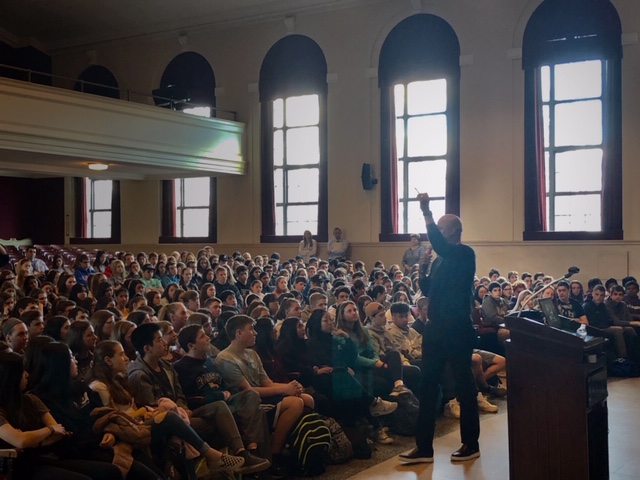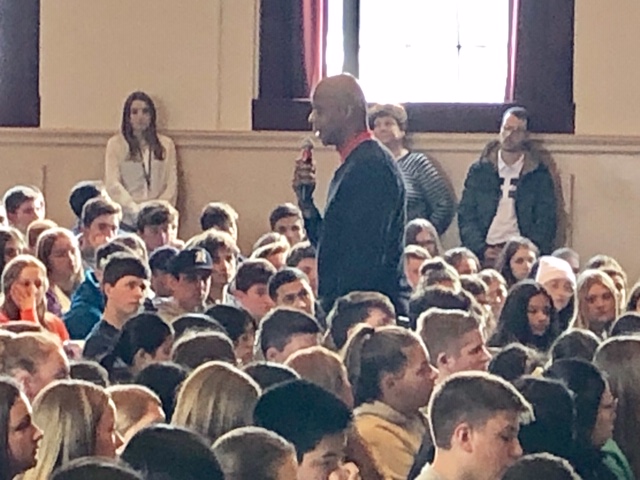When Darryl Strawberry went through his struggles with drugs, he did not have the luxury of privacy. In 1986, he was a member of the swaggering, World Series-winning New York Mets, a team legendary for hard living, with Strawberry taking a lead role when it came to partying.
When reports of his inability to stay away from drugs hit the media, he went National Pastime to national punchline. Everybody in America knew that Strawberry couldn’t stay straight.
And then one day, 16 years ago, he hit bottom, which is defined in 12 Step recovery as the moment when you can no longer lower your standards to match your situation in life. Strawberry hasn’t had a drink or a drug since.
Now he carries his message of loss, recovery, and hope, to high schools throughout the New York area. Not just in the city high schools, but affluent, middle class high schools as well.
“That’s what kills me,” Strawberry says. “Parents in the suburbs hide! They don’t want to show up when I come in as a speaker! They say, ‘Oh, my kid doesn’t have problems. We don’t have problems here.’
“And then I go into the school and the administrators tell me, ‘Thank you for coming, because we have so many problems with drugs in this school. Our kids’ parents think that because they live in such great neighborhoods, they don’t have drug problems. But they do.’
“The parents are starting to find out that they have the same problems as inner city communities. So I’m trying to carry a message of hope.”
At 6’6”, Strawberry is as physically imposing as ever, and his story of plummeting from the heights of fame, celebrity, and fortune to the depths of addiction captures the attention of students, no matter where the school is located.

“They pay attention because I talk about real things,” Strawberry says. “I tell them about fame. I tell them about fortune. I tell them about brokenness. I tell them about emptiness. And I tell them about loneliness.
“I tell them that at the end of the day, drugs will take you down a road you could never imagine, and they will keep you there longer than you could ever imagine. So I encourage them. I tell them, Don’t start.
“They listen because they know I’ve been somewhere and I’ve done something. That’s the good part about being a celebrity. But my message is not about me being important or being a great baseball player. It’s about me sharing my life with them, explaining what can happen.
“Everybody sees celebrities on television and they wonder why celebrities are so dysfunctional, when from a material place they have everything. The answer is that they have nothing on the inside to make them feel well. And they have so many people around them, as I did, who always cover up for them. That’s why they don’t make it out of the darkness. My job is to make sure that the kids don’t go into the darkness in the first place.”
Strawberry believes that the drug problem facing America’s youth is even worse today than it was in the 1980s, when he was a teenager and in his 20s.
“Some kids are skipping past marijuana straight to opioids and heroin,” he says. “It seems like every kid’s got that stuff in his pocket. You go to the party and they pass something out to you, and you get a taste of it, you get it in your system…you are going to like that feeling. The feeling of being high is something everybody likes, especially kids. They’re so young and their brains have not matured. So when the drugs hit their brains, they love it, they can’t get away from it, and they just get so addicted to it.”
Strawberry tells high school students that when they move onto college or whatever comes next, they won’t have the same sort of scrutiny from parents and teachers as they do now.
“Nobody’s gonna come searching for you when you don’t come to class,” he says. “If you don’t show up, you just don’t show up. Most kids get into college and they find themselves in the trap of going to parties, drinking, and getting addicted to different things, and it’s easy to lose your way.”
The fact that Strawberry won a ring with the ‘86 Mets resonates with the kids and gets their attention, but it’s his sincerity that holds them rapt.
“They know I’m real,” Strawberry says. “They know I’m telling the truth. They know that I’m not sugarcoating it. I tell them I had everything, millions of dollars, homes, cars. But I really had nothing because I was broken. But the thing that really gets them, is when I tell them that I love them.”
Strawberry believes that addiction is rooted in a sense of lack of love, and that if young people only understood just how much they were loved, they might not feel the need to drink or use.
“I tell them I love them every time I speak, and it just blows their minds,” Strawberry says. “This is what they need to hear. It’s not about socioeconomic level. You’ve got the same dysfunction and trauma and brokenness in the middle class that you do in the inner city. I tell the kids that addiction is very powerful and it doesn’t care if you’re rich or poor, black, white, or blue. It doesn’t matter.”
Strawberry recently spoke at River Dell Regional High School in Oradell, New Jersey.
“Darryl was invited here,” says Lorraine Brooks, River Dell’s principal, “because of his unique story and his ability to connect with young people. His presentation was outstanding. One could hear a pin drop in the auditorium filled with over 700 students listening and truly engaged in what he was saying. Young people are very good at ‘sizing up’ adults and they believe Darryl Strawberry, whose compassion and humanity comes shining through.”

“It’s on my heart to go into high schools and carry this message,” says Strawberry. “Young people are not even living,” he says. “They are losing their life before they’re 25. They’re ODing and dying at 19, 20, 21, 22. Opioids have changed the game. We’re facing the biggest epidemic that I’ve ever seen in my life. That’s why I go back into the schools, because I want to educate kids. Above all, I want to tell them I love them. Because I do love them. And if they hear it from me, maybe they’ll start hearing it from someone else. And maybe they won’t have to die or come close to it, the way I certainly did.”
To bring Darryl to your high school, contact Stacey Braff at [email protected]

